AmmoniaDrive
The University of Amsterdam and TU Delft will lead an academic-industry consortium that will determine the feasibility of combining ammonia-fed solid-oxide fuel cells with internal combustion engines for maritime propulsion. The AmmoniaDrive project just received over €2 million in support from the Dutch government, and is the latest in a series of hybrid and fuel cell-based propulsion projects using ammonia as an onboard fuel.








